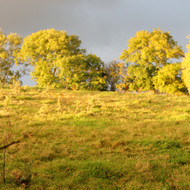Autumn in the Quickcrop Vegetable Garden
While I do find the Autumn beautiful I must confess to getting a little bit sad at the retreat of the warmer Summer weather and fact that my garden is shutting down with nothing I can do about it. Of course there's still plenty to keep me amused but the emphasis changes from growing to conserving and preparing. Here's a list of things to do this October to ensure next years growing is even better than this one.
Clearing and Composting If you have any winter crops in the garden give them all a bit of clean up by removing any dead leaves and weeding around the plants. Yellow dying leaves can be an entry point for disease and as you've managed to get them this far there's no point in loosing them at the final hurdle. Dead leaves and weeds on the ground are good hiding places for slugs so again a good idea to get rid of them.
If you're clearing the garden you will also have plenty of organic material to go on your compost heap or into your compost bin.

We find the simple wooden compost bins much easier to make good compost. You need to be a lot more careful with your ingredients in a closed plastic bin as you don't get as much air through it. Naturally we stock timber bins, you can click through to our compost bin shop here.
Feed and protect your soil As we know vegetable gardening is quite hard on your garden soil. Plants require a lot of nutrients to produce a good crop but also remember we're removing those nutrients when we harvest and eat the vegetables. Unlike a natural cycle where manure is returned to the soil this doesn't happen with us so the cycle is broken and unless you feed your soil it will suffer.
The soil is the single most important thing in your garden and now is the time of year to give it a bit of T.L.C. You need to get your hands on some good organic matter like manure, good garden compost (I don't mean peat compost, I mean rotted green material you make yourself) or seaweed. The reason we add these materials a this time of year is to give them tie to rot down over the Winter and early Spring.

You can never produce enough garden compost from your garden waste as you remove and eat so much of the material. Luckily there are large scale composters who produce this material on a commercial scale. We work with a company in North Wales who produce an excellent compost material. Unlike many composters we've come across these guys rot the material for over 3 years to make sure it has decomposed properly.
These can be an issue with commercially produced compost which contains a lot of partially rotted woody material as it can actually take nitrogen from your soil. The woody material needs nitrogen to break down properly so can temporarily lock it up. Once the composting process has finished the nitrogen is released again but you may have a disappointing harvest in the meantime. You may also experience the same problem if you use horse manure from a stables that uses wood shavings as bedding.
You can purchase our excellent well rotted organic soil improver here.
Protect your soil Once you've gone to the trouble of adding plenty of organic matter to your soil you need to make sure it stays there by putting down a protective covering. Many of the nutrients in the soil (especially nitrogen) are soluble and will be washed out by the winter rain. Your vegetable plot might look very nice cleared of weeds and spent crops but it's very important you protect it and try to lock in the nutrients.

We are in October now so you're a little late to sow green manures. Field beans would be the only ones you'll get away but is still worth a go if it doesn't get cold too quickly. We use black plastic which you can get fro an agricultural supplies shop as we have a large vegetable plot. The black covering might not look great but it has the advantage of absorbing some of the sun's energy helping to warm the ground underneath and speed up the rotting process. If you are growing in smaller areas a weed block membrane like mypex is suitable as is a thick layer of cardboard or a piece of old carpet.
Planting onions and garlic You can still plant Autumn onions up until the end of October and have plenty of time for garlic.

